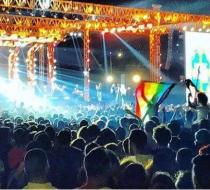Mashrou’ Leila Favorite
CAIRO — Seven Egyptians were arrested on charges of promoting homosexuality after concertgoers waved rainbow-colored flags at a rock concert in Cairo last week, Egyptian officials said.
The arrests were the latest assault on social freedoms in Egypt under President Abdel Fattah el-Sisi, whose government has imposed harsh restrictions on free speech and led an aggressive campaign against gays.
Photos and video clips of audience members waving rainbow flags during a performance on Friday by Mashrou’ Leila, a popular Lebanese band whose lead singer is openly gay, were shared widely on social media over the weekend. On its Facebook page the band called the concert “one of the best shows we’ve ever played!”
But the images provoked a backlash from conservative Egyptian politicians and television hosts, as well as a heated debate on social media that featured virulently homophobic comments.
On Monday Egypt’s top prosecutor, Nabil Sadek, ordered an investigation and by evening the police had arrested seven people, most of whom were said to have waved rainbow flags.
An official at Mr. Sadek’s office said the seven had been charged with “promoting sexual deviancy” and could be detained for 15 days. The state paper Al Ahram said one of the men had been detained for posting approvingly on Facebook about the concert.
“Legal actions against him are underway,” the paper reported.
On Monday, one man who had been photographed with a rainbow flag at the concert wrote on Facebook, “Had I raised the ISIS flag I wouldn’t be facing half of what I am facing now.” The man, who said he was not gay, did not respond to requests for comment. It was unclear if he was among those arrested.
A second prosecution official said the seven arrested men would undergo a forensic medical examination to determine if they have had anal sex. Such tests are standard practice in Egypt, but they have been condemned by human rights groups as a form of torture.
In an apparently separate case, a student who attended the Mashrou’ Leila concert was arrested hours later after being “caught in the act,” the police said. The student was charged with “debauchery” and sentenced to six years imprisonment on Tuesday.
The police lured the man to a location near the pyramids using a fake profile on a dating app, and arrested him.
Homosexuality is not illegal in Egypt, but the authorities frequently prosecute gay men for homosexuality and women for prostitution under loosely-worded laws that prohibit immorality and “habitual debauchery.”
Musical concerts are one of the few public gatherings still permitted to young Egyptians, who otherwise chafe under harsh restrictions introduced by Mr. Sisi that have outlawed public protest, led to prosecutions of writers and the censorship of films and music deemed critical of the government.
Mashrou’ Leila is a wildly popular band across the Middle East, with its exuberant brand of Arab indie rock. The band’s lead singer, Hamed Sinno, is one of the few openly gay celebrities in a Muslim country, and has spoken publicly about his orientation.
The band’s following grew after the Arab Spring, as it rode a wave of youthful openness, but it has since fallen foul of conservatives in different countries. It was twice banned in Jordan after facing accusations of blasphemy and not respecting the country’s traditions.
Egypt’s pro-government musicians union denounced last Friday’s concert, and said it was considering a ban on future performances by Mashrou’ Leila. In 2016 the syndicate drew sharp criticism for its effort to stop a heavy metal concert in Cairo that it claimed had been organized by “devil worshipers.”
Ahmed Mahran, a law lecturer who filed the criminal complaint against the flag-wavers, conceded in a phone interview that some were minors. “But it doesn’t matter,” Mr. Mahran said. “We need to set an example.”
He added, “These people must be treated with force and cruelty.”
The crackdown on gays in Egypt gained global notoriety in 2001 with the high-profile raid on Cairo’s Queen Boat nightclub, which led to dozens of arrests. The Arab Spring ushered in a brief period of respite, but that door snapped shut again in 2013 after the military takeover that brought Mr. Sisi to power.
Since then, the security forces have sought to entrap gay and transgender people on dating sites by impersonating other gay people. Last year the advocacy group Solidarity with Egypt LGBTQ+, which monitors news reports of criminal investigations, said at least 274 people had been charged.
Mr. Sisi’s government has also used the language of public morals to suppress critics. On Monday a court convicted Khaled Ali, a lawyer and opposition figure, for making an obscene finger gesture outside a Cairo courthouse last year after he and other lawyers won a case against the government.
Mr. Ali, who was a candidate in the 2012 presidential election, has expressed interest in running again in 2018. If an appeal court confirms Monday’s conviction, he would be ineligible for the race.






